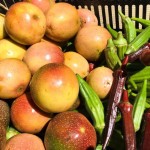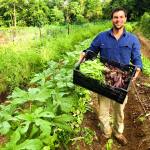Growing up on Christmas Island, co-founder Mark Bennett was hungry for fresh food from an early age. Mark’s interest in food security and passion for sustainable farming practices was inspired by his first- hand experience of living in an isolated community where you could wait months for fresh produce and delivery was dependent on the swell which often prevented container ships docking. Once unloaded there was still no guarantee of freshness, with food often spoiling on the voyage. Paying an exorbitant price for low quality fruit and vegetables was and still is the reality facing Christmas Islanders. It is not uncommon for a normal bag of groceries to cost over 250% more than the price of mainland staples, and individual items such as iceberg lettuce and cauliflower can easily fetch $12 and $15 respectively.
With his boyhood home an organic farm near New York City, co-founder Paul Taylor’s access to prolific fresh produce was literally worlds apart. Traditional organic farming methods fuelled a fire of respect for the earth and its life giving soil, that decades later, is still burning.
Mark and Paul’s collaboration began in 2008 when Mark attended one of the many workshops that Paul gives on land management and the powers of compost. They soon realised a shared vision and philosophy, recognising we now live in a time when more and more people are competing for fewer resources and that if we are to feed ourselves into the next century drastic changes to our farming methods are needed.
The seeds were sown for what was to become the first Hidden Garden Sustainable Farm, in the very place that first inspired the journey – Christmas Island some 2,700 kilometres North West of the Australian city of Perth. The name of our inaugural sustainable food farming project, Hidden Garden, is intrinsically linked to the Island’s history. During the early days of phosphate mining, food was not always plentiful. Mine workers, as indentured servants to the English, were often fed poorly. In a response to this food insecurity, ‘Hidden Gardens’ were planted in the forest to supplement food shortages and guard against nutritional diseases. As the name suggests, these gardens were hidden from their Colonial managers for fear of punishment and, in so doing, they became an early example of food sovereignty – the right for people to have the knowledge and resources to access fresh food at an affordable cost, wherever they may be.



